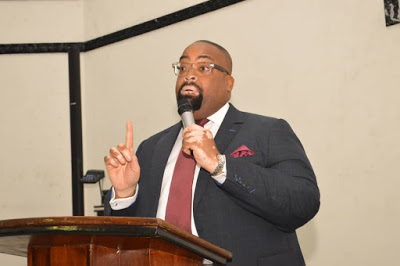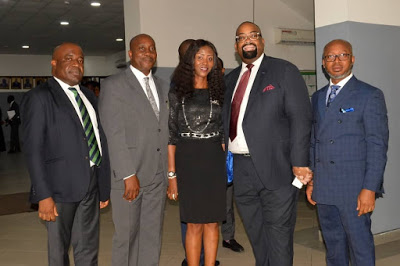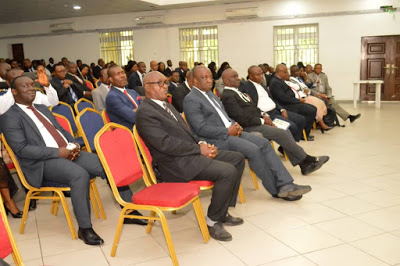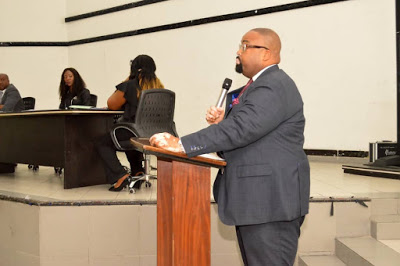
Introduction
I must thank you for inviting me to this very important community within the NBA, to share my thoughts on a very important and timely issue. In an organization as big as the NBA, it is often easy for members to feel disconnected from the organization. The core value to be derived from meetings like this was captured by the celebrated Chinua Achebe when he said:
‘When we sit under the moonlight with our kinsmen, it is not because we want to see the moonlight – everyone can see it from his own compound. When we come together to feast, it is not because we are hungry- everyone has food in his house. It is because we are one, and it is right for us to do so.’

That is why branch meetings like this are very important and I must commend the leaders of this branch for organizing this meeting. Meetings like this sustain us as a community of lawyers, foster comradeship, and enable us to discuss very topical issues like the one we are here to discuss.

The Place of Lawyers within Nigeria’s Economy
As at October 2019, the IMF assessed Nigeria’s GDP to be slightly above US$ 446.5 Billion. Although this figure indicates a 21.4% drop from what our GDP was in 2014, it still earns Nigeria the title of the largest economy in Africa in terms of nominal GDP. It is often easy to take a myopic view of Nigeria’s position in Africa by looking solely at the nominal GDP and the aggregated performance of all sectors within the economy. Taking that view is quite restrictive and would prevent us from adequately identifying all of the areas requiring the services and finesse that only lawyers can provide. In conversations like this, many people tend to forget that Nigeria is also the largest in Africa in terms of actual human resources. Nigeria has a population of approximately 200.96 million people according the IMF’s most recent estimates. This represents a workforce, a market, and a pool of potential clients for our colleagues who operate outside the core corporate and commercial sphere.
In simple terms, lawyers are the backbone of the economy. Our legal system is founded on received English law, the bulk of which is common law. Common law is a system of laws designed to maximize the wealth of society – the economy. As lawyers, therefore, everything we do has a direct impact on the economy. For example, our colleagues specializing in general contract and property law are performing key functions in the economy as they are concerned with creating and defining property rights or rights to the shared or exclusive use of valuable property, and facilitating the voluntary transfer of property rights into the hands of those who value them the most. In the same vein, our colleagues specializing in general torts law are also serving the economy by protecting personal and property rights.
Our colleagues specializing in criminal law are also extremely important for the preservation and development of our economy. When battery becomes grievous harm or murder; or when assault becomes sexual assault and rape; or when passing-off becomes criminal deceit or fraudulent misrepresentation; or when trespass to chattel, conversion or detinue becomes extreme and takes on the character of corruption, robbery, theft, or stealing – or as the economist would describe it “the pure coercive transfer of wealth or utility from the victim to the wrong doer” – then criminal law kicks in. Therefore, accentuating the importance of our colleagues carrying on in the critical function of criminal prosecution and criminal defence. Thus, from an economic perspective, criminal law is essentially a more punitive backup to tort law.
Our colleagues specializing in constitutional and administrative law may also feel that their roles within the legal system are tangentially related to wealth maximization and the development of the economy. That is also the wrong view. The law and politics of revenue allocation, election cycles, court system, national budgeting, fundamental rights and the basic principles that should undergird state policy (to mention a few) are largely regulated by the Constitution. These are issues that impact directly on our economic wellbeing as a country.
The public service and all regulatory offices fall within the purview of our colleagues practicing administrative law, whether as legal officers in government departments or in the private sector. Virtually all businesses done in Nigeria and all taxes paid are conducted and paid through regulatory offices. It is therefore easy to articulate the crucial roles our colleagues in that realm should play or should be playing.
As a developing economy, Nigeria is very reliant on international private capital in the form of foreign direct investment. The capital flows into Nigeria encourage investment in and expansion of our manufacturing (including extractive industries), financial services, communications, technology, power, entertainment, real estate and hospitality sectors. This provides an array of opportunities for lawyers with different skill sets and has triggered an increase in the demand for commercially aware and business savvy lawyers. Business structures and practices within Nigeria are becoming much more complex, nuanced and are evolving rapidly. Regulators, on the other hand, are evolving at a significantly slower rate and this generates regulatory risks and inefficiencies for the businesses operating in Nigeria. In addition to this, when new laws or regulations are enacted, old businesses have to adjust, and the new ones have to comply. This creates a special and unavoidable need for lawyers with a sound understanding of the legal needs of these businesses, their commercial objectives, and the regulatory environment. In fact, industry professionals and business leaders know that they need to maintain a strong relationship with us in order to avoid regulatory landmines, accelerate growth, and maximize returns.
Although, the legal system appears to sit within the economy, a deeper squint would reveal that the economy and finance are actually legally constructed and do not operate outside the law. Financial assets are contracts, the value of which depends largely on their legal vindication. Whether a financial asset will or will not be vindicated is a function of legal rules and their interpretation by courts and regulators. The same holds true for the economy and every sector within it since the economy is essentially the aggregation of the financial and other assets within the country. This means that our duty to serve and protect the legal system imposes an obligation on us to serve and protect the economy. The key roles we play in facilitating knowledge exchange, the interpretation of laws, and law reform also helps in reducing the regulatory risks associated with doing business in Nigeria and encourages the international flow of investment capital to Nigeria.

Above all else, our colleagues in the academia play the most important role because besides the fact that their research facilitates law reform, they dedicate themselves to the training of those who would perform these key functions and serve the economy tomorrow and in the future.
Having gone through all of the above, the answer to the question of where lawyers fit in becomes significantly simple. Quite literally, lawyers fit in everywhere. We fit nicely into every cell in every sector of Nigeria’s economy; and in those cells, we are the mitochondrion. For those of us who may not remember our elementary biology, we are the powerhouse since we advise on what is legally permissible or not, facilitate the making and interpretation of laws, facilitate the enforcement of rights and the resolution of disputes, provide commercially sound legal advice to the businesses feeding the economy, and most importantly, we train those who would perform these functions tomorrow and in the future. We are the crucial link that bridge the gap between the legislative intention, the judicial interpretation, and the market reality.
To my mind, therefore, the more appropriate question is: do we all have the nuanced skills required to sufficiently perform our roles in servicing the economy?
Nigeria has been a mono-product economy for a very long time, and this has had implications on the structure of legal practice, the required skill set and training needs (pre and post Call). However; in the past two decades, successive governments have made concerted efforts to diversify the productive base of our economy. The progress has been very slow but their efforts have led to significant improvements in telecommunications, power, financial services, agriculture, oil and gas (hydrocarbons generally), media and entertainment, technology, and increasingly, sports. These are all sectors that require nuanced legal services both on the transactional side and on the dispute resolution side.
Sadly; we, who are supposed to be servicing the economy and all sectors of it, still rely very heavily on the structure of legal practice, the skills set, and training methodologies established under and designed for the slowly fading mono-product structure of our economy. The economy is changing, and with it, the market for legal services is also changing. The problem is that existing and future lawyers have failed to change with the market. We are not dynamic. We are largely still stuck in the 90s. Most lawyers today are not fit for purpose and the more worrisome issue is that even those who are undergoing training to become lawyers may not also be fit for purpose if nothing is done to correct the trend.
For example: Nigeria has been producing hydrocarbons for decades. How many lawyers understand what hydrocarbons are and can comfortably advice a hydrocarbon business on the legal and commercial issues related to the establishment, management, financing, restructuring and dissolution of such a business? We regularly hear of feuds between record labels and artists in the entertainment industry and of feuds between football club owners and their players. How many lawyers understand what contracts and disputes in those sectors entail? The same goes for technology and even general dispute resolution. Dispute in court is the end game in today’s world. It should not typically not get to court if lawyers have done their work well in the contracting stage and at the stages of alternative dispute resolution. Leaving titles and suffixes aside, how many lawyers are actually skilled in alternative dispute resolution?
Nigeria depends, a lot, on international private capital in the form of foreign direct investment. The providers of this capital do not trust Nigerian lawyers. Typically, they engage English lawyers and only use Nigerian lawyers on specific questions on Nigerian law. Increasingly, we see that many indigenous investors are also losing faith in Nigerian lawyers. They engage foreign lawyers to advise on the technical parts of their transactions and only resort to Nigerian lawyers on specific questions of Nigerian law. Truth be told, the fact that most of us are still able to practice law and earn a living is due largely to the protectionist provisions in the LPA and the RPC. Foreign lawyers are taking away business from us, to the extent they can, and when the AfCFTA goes live, many Nigerian lawyers may be relegated to the sidelines.
Ideally, when the government pursues a policy that encourages development in a specific sector of the economy, that policy should also include modalities for the training of lawyers to service the legal needs of that sector. For instance, a policy designed to encourage the development of the agricultural sector should also include strategies for teaching agriculture in schools, for teaching food and agriculture law to law students, and for providing continuing legal education on food and agriculture law to interested lawyers. But overtime, the government has failed to designed such all-encompassing policies. That does not mean that the NBA must fail too.
The NBA is an extremely influential organization and it must rise to the occasion. It must ensure that the economy is serviced by lawyers who are reasonably fit for purpose. If the government fails to drive the policy on nuanced legal education, the NBA must design and drive that policy. The NBA must ensure that the training methodologies at the universities and the law school are designed to produce lawyers who understand the nuances of the current and emerging market for legal services. The NBA must ensure that there are credible continuing legal education programmes for existing lawyers to support the development of the skills required to provide nuanced legal services.
Conclusion
The productive base of our economy is expanding, and with it, the market for legal services is also expanding. We must ensure that the legal skills we have are fit for purpose and are able to adequately serve the economy. The NBA has a major role to play in designing and driving the policies that will support the development of the nuanced skills set required to service that economy. We must all be committed to ensure that it plays that role to the best extent possible.
Thank you very much for listening.
